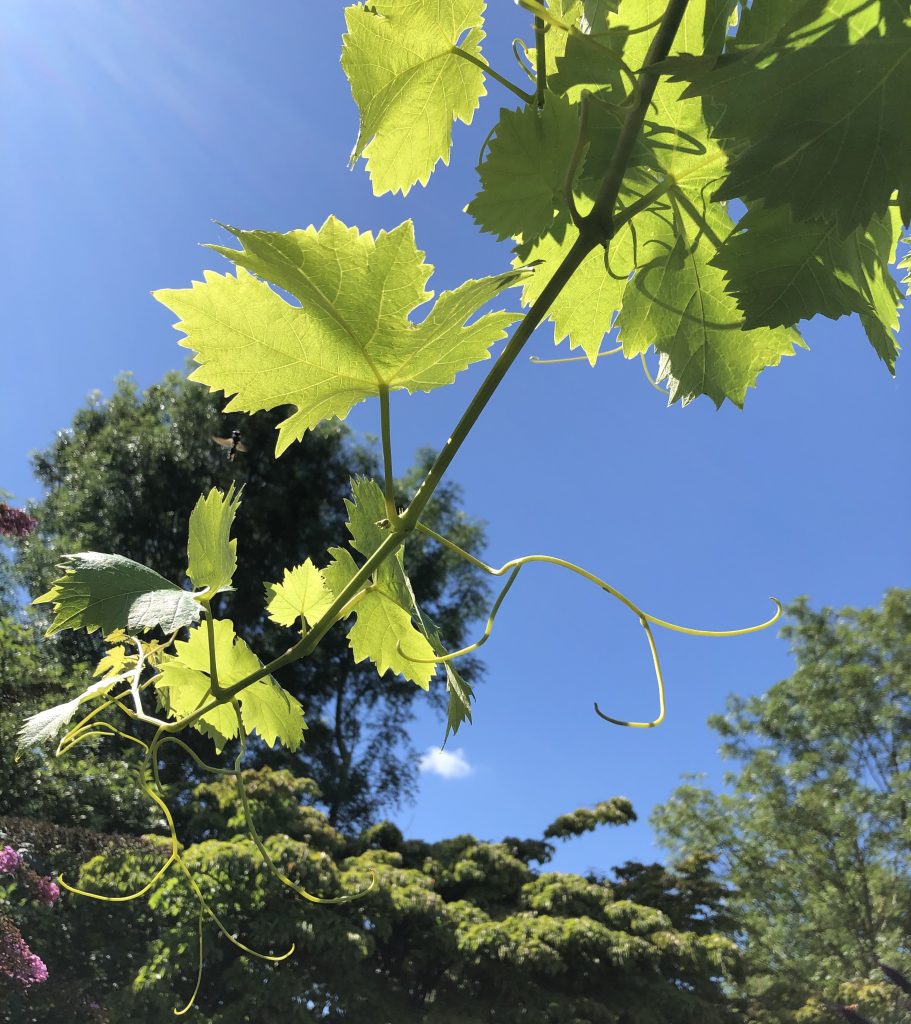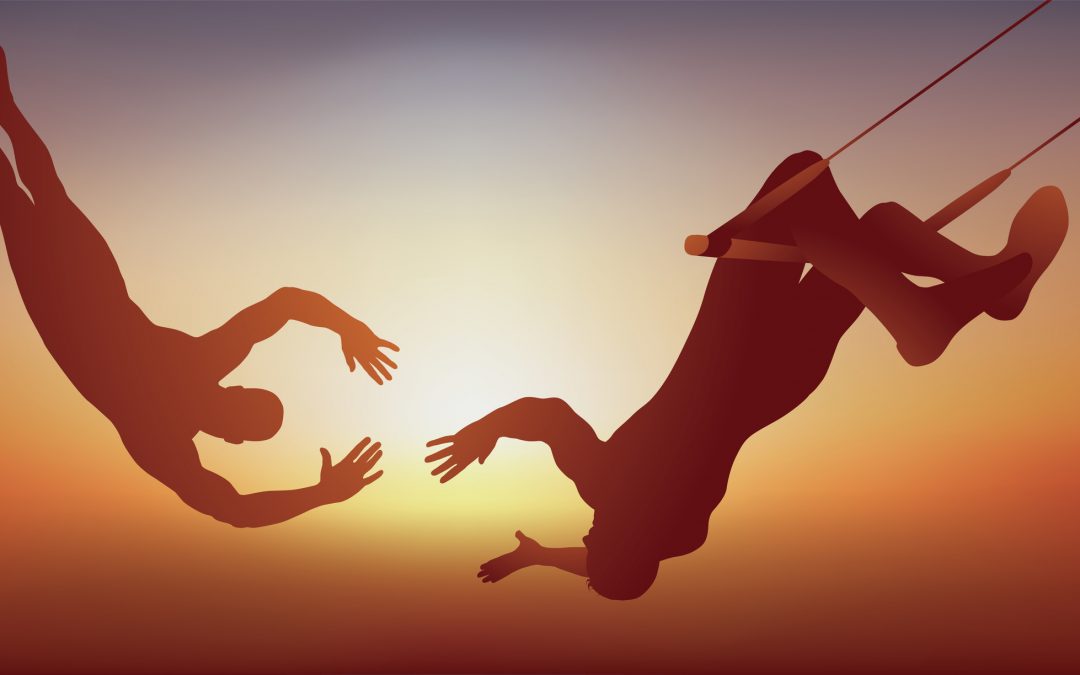Not knowing yourself and relying on the other
Source: Dutch Wikipedia
Nature as a mirror
It’s Saturday morning. I am in the garden and wake up from one of the gardeners who is busy with the chainsaw. When I get up and open the curtain in front of the kitchen window, I see that the weather is lovely and the sun is shining. The garden suddenly looks very different after a few rainy days.
I notice something that I hadn’t noticed last night when I got here. The grape that is behind our garden house not far from the kitchen window seems, because of the rainy days with its enormous shoots full of large green leaves, to cross the kitchen window and then take over a large part of the back wall of our garden house. It seems as if the long shoots continue to grow until they have found a place where they can hold on to. And these long green shoots full of big leaves are the first thing I see when I open the curtain.

He instinctively finds the way that suits him
I was reminded of the discussion I recently had with Pierre, my partner, about the “uncontrolled growth” of the grape, and that I thought we should make something that the grape could (read: should) move past. He did not think that was necessary. He said: Just let nature take its course. That grape will instinctively find the way that suits it best. In other words, do you dare to rely on nature itself.
As humans we are ‘saddled’ with our mind
In front of the kitchen window this morning, I realize how differently my Partner and I look at this. I have previously written how differently we are each in our own way working in our allotment and whether or not we dare or want to surrender to the ‘nature’ of nature itself. It has to do with trust and daring to let go. Trust in how nature develops, grows, flourishes, dies in its own way and follows its own rhythm and destination. And it has to do with my personal need for control and structure. Where my partner weeds as little or not at all as possible, leaves the soil alone, so that many seeds that the plant has released in the spring after a long winter have a chance to germinate and grow, I have a need to structure the garden and weed everything neatly ‘clean’. Order, structure, control.
Dare to be open and look at myself
All these ‘garden’ thoughts bring me to my experiences of the past months in working with my clients. I am in the privileged position that during the training courses I follow in working with the constellation method, I receive feedback on how I am present in my role as a facilitator in facilitating a constellation. During the training in a small group, we are given the opportunity, under the supervision of the trainer and watching fellow students, to investigate and draw up our own intention and / or to supervise a constellation ourselves. A way of working in which confidence in the process of the questioner is extremely important and at the same time dare to look at their own attitude and role as a facilitator. The feedback I get usually has to do with the tendency I have to ask too many questions in the process or sometimes even try to give direction to the process. It is as if I am trying to create structure and order in the image of the garden, and I am going to make a point of reference for the long shoots of the grape.
If we really take the position of trust, than we don’t need to ask the question’s
Vivian Broughton
Transference and Countertransference
I know that my tendency to ask to many questions or to direct the process has to do with wanting to be in control and perhaps even prevent a client from feeling uncomfortable. The possible discomfort of the client and myself resonate with each other here. In therapeutic language you can say that I end up in the transfer and countertransference together with the client. This is inevitable and always happens. What’s important is that I am aware of this. Aware that there is something that makes me uncomfortable, something that I feel I need to control Working with the constellation method is pre-eminently a method of not relinquishing control to the ‘head’ but daring to trust the client’s own process. Trust in the other’s own wisdom and the information stored in the different layers of the subconscious and in the body, which is waiting to be liberated and, where possible, visible to the client himself.
Knowing where you don’t know
It is a surrender in trust to a knowing where you do not know. And it is this paradox that we often have such a hard time with. Knowing where we don’t know. We have become familiar with knowing and understanding from our mind and have lost contact with our proper nature. We think that when we understand it, we can change it or let it go. We have all ended up in a kind of survival mode where we hold ourselves for fear of ‘falling’, fear of not finding anything to hold on to.

The therapist or counselor as an external unifying center
The large green shoots of the grape bring me to my experiences with confidence and trust in our garden, in my work and in myself. Trust in our human nature where we seek connections from nature that heal and support us. Fortunately, when we have become wounded in this natural need to connect with who we really are, that same nature is also able to protect us and activate survival mechanisms for survival. Whatever happens in our lives and how injured we have been, there is always a part of our healthy nature that remains protected in our lives. We try to make contact with this in counseling and therapy. And that starts with the confidence that this healthy part is present, even though the client often no longer feels it. As a counselor and therapist we mirror at that moment what the client cannot experience in himself. In Psychosynthesis we say that the therapist is present as an ‘external unifying center’ for the cliënt.
Working with the different layers of our consciousness
Like my clients, I, too, have experiences with injury in my own confidence and trust and have learned in my life to find support through all kinds of survival strategies and to survive in situations where I was not wanted, loved or protected. And most of these experiences we are not consciousness about, because they are stored in our body and subconscious mind in the very beginning of our existence (often well before we were born). Experiences that can be brought back into our consciousness by means of, for example, the constelllation method (IoPT). Working with creativity, language and imagination can also be a means of granting us access to those layers within ourselves that we usually have shielded to protect our consciousness. In Psychosynthesis we recognize not only a lower unconscious but also a higher unconscious. Not only a cellar but also an attic. Not only the dark but also the light.
We are nature
Back to the grape that grows in front of the kitchen window in our garden. It is special how nature mirrors me in my desire for confidence and trust. Trust in the process of our (human) nature. We are nature and as human beings part of this nature. And we are endowed with a brain that has been further developed in humans in evolution, with a mind with which we can enrich ourselves and achieve self-awareness, but also hinder ourselves through beliefs in which we have fixed ourselves, which then determine our self-image and our behavior.
Not knowing it yourself and relying on someone else
When you look up the word trust, according to Wikipedia the word trust contains one of the following elements: Not knowing yourself, and relying on someone else. And this is exactly what I have been facing with my clients in recent months, as we begin to explore the process to setup an intention together. As a facilitator of the process, I dare to ‘rely on’ my cliënt’. To trust that everything is present in the client that is needed for his or her process and that it is essentially about daring to trust again in the own inner wisdom and life force that is waiting to be liberated by yourself. Then as a facilitator I only need to be present. Have confidence and trust in the cliënt and myself.
Be very welcome in the practice for Psychosynthesis Amsterdam to create a space for trust and to meet yourself in both your anxiety and your desire. In both your tendency to reach out and make contact and your tendency to avoid and withdraw. It is allowed.
